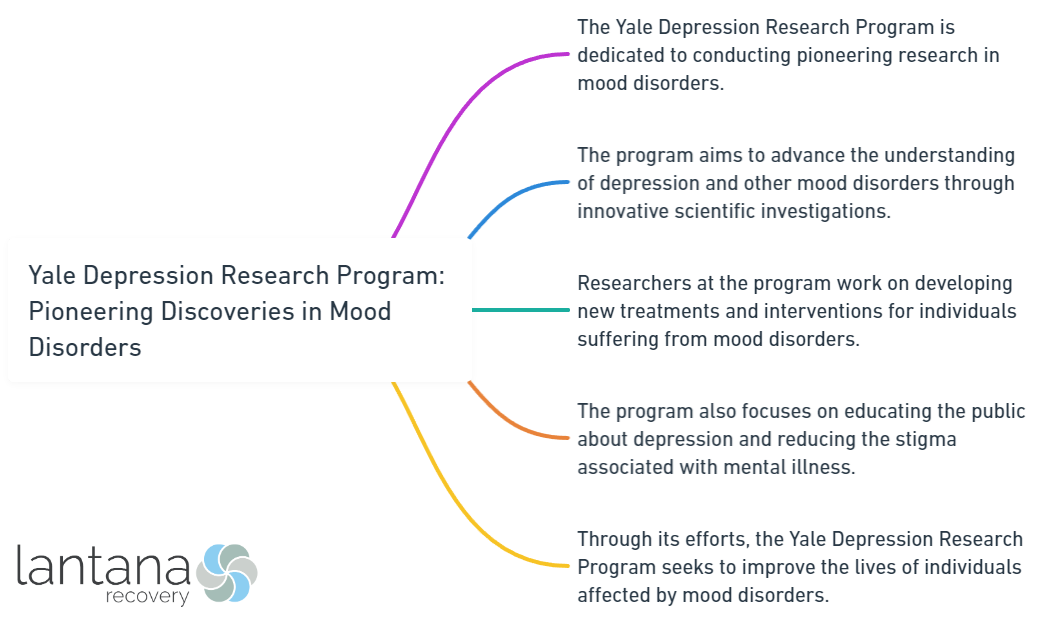The Yale Depression Research Program has been at the forefront of groundbreaking discoveries in the field of mood disorders. Led by a team of renowned researchers and clinicians, the program aims to unravel the complexities of depression and develop innovative treatments. With a focus on understanding the underlying mechanisms and identifying biomarkers, the program has made significant contributions to the field of psychiatry. By studying the role of genetics, investigating the link between depression and inflammation, and advancing treatment methods, the program has achieved pioneering breakthroughs. In addition, the program is committed to expanding research on novel therapeutic approaches, addressing disparities in mental health care, and fostering collaborations with other institutions. These ongoing efforts ensure the continuous progress and future directions of the Yale Depression Research Program, transforming the landscape of mood disorder research and treatment.

The Yale Depression Research Program
The Yale Depression Research Program is making strides in understanding and treating mood disorders. Led by a team of dedicated researchers, the program is at the forefront of discoveries in this field.
Through research and clinical trials, the program has uncovered insights into the causes and mechanisms of depression. These findings have led to innovative treatments that improve the lives of individuals with mood disorders.
One focus of the Yale Depression Research Program is investigating the role of genetics in depression. Their studies have revealed certain genetic factors that increase the risk of developing depression. By identifying these markers, the program aims to develop personalized treatment approaches.
The program also studies the impact of environmental factors on depression. Research shows that childhood trauma or chronic stress can contribute to mood disorders. By understanding these influences, the program recommends strategies to enhance mental well-being.
Furthermore, the Yale Depression Research Program collaborates with other institutions and researchers to expand knowledge. This collaboration allows for the sharing of valuable data and insights to advance the understanding and treatment of depression.

What Is the Yale Depression Research Program?
The Yale Depression Research Program at Yale University aims to improve our understanding of mood disorders and develop innovative treatments. What Is the Yale Depression Research Program? The program conducts research, collaborates with experts, and shares findings to benefit individuals with depression.
The program uses various research methods, including clinical trials, genetic studies, neuroimaging techniques, and psychotherapy interventions. Its goal is to identify the causes of depression, explore risk factors, and evaluate treatment effectiveness.
An important focus of the program is to uncover genetic and environmental factors that contribute to mood disorders. By studying a large sample size and analyzing genetic markers, researchers can identify vulnerabilities and risk factors in individuals prone to depression.
The program also investigates the psychological and neurobiological mechanisms of depression. Using advanced neuroimaging techniques, researchers examine brain structures and functions related to depressive symptoms. This knowledge helps develop targeted and effective interventions.
Ultimately, the Yale Depression Research Program aims to translate scientific discoveries into evidence-based clinical practices that significantly improve the lives of individuals with mood disorders. It represents a significant advancement in depression research, offering hope to millions of people worldwide affected by this condition.
What is the Purpose of the Program?
The Yale Depression Research Program serves the purpose of advancing understanding of mood disorders and making groundbreaking discoveries in psychiatry.
The program’s primary objectives include identifying biomarkers for depression, developing advanced treatment methods, exploring the role of genetics in depression, and investigating the link between depression and inflammation.
Through their research, the program aims to enhance the diagnosis and treatment of mood disorders, ultimately improving the well-being of individuals impacted by depression. By identifying biomarkers for depression, the program can develop more precise diagnostic tools and personalize treatment approaches.
Additionally, the program strives to cultivate proficiency in psychiatry by creating innovative treatment methods that go beyond traditional approaches.
Furthermore, the research program seeks to understand the genetic factors contributing to depression, leading to the development of targeted therapies. It also explores the link between depression and inflammation, investigating potential connections and their impact on mood disorders.
The program actively collaborates with other institutions and researchers, which enhances their research capabilities and facilitates knowledge sharing. This collaboration allows for the expansion of research on novel therapeutic approaches and addresses disparities in mental health care, thus making significant contributions to psychiatry.
Moreover, the program aims to raise awareness and provide educational opportunities for individuals interested in the field. By doing so, the program has a positive impact on the lives of individuals affected by depression.
ENTPs, known for their creativity and enthusiasm, may be at risk of depression when their relentless pursuit of ideas and independence becomes overwhelming, leading to burnout or a sense of purposelessness. Read our article on ENTP and depression to find out this specific MBTI personality type is more prone to depression.

Who is Involved in the Program?
The Yale Depression Research Program involves a diverse group of professionals who are all key contributors to the understanding of mood disorders.
Researchers: These esteemed professionals conduct comprehensive studies into depression, collecting and analyzing data to further our understanding and make new discoveries in the field.
Clinicians: Experienced clinicians play a crucial role in the program, working closely with depressed patients and providing valuable insights that inform our research efforts.
Scientists: We have specialists in neuroscience, genetics, and pharmacology who contribute their expertise to help unravel the intricate biological mechanisms of depression and develop innovative treatment approaches.
Psychiatrists: Collaborating psychiatrists are an essential part of our team, bringing their extensive clinical experience to the table and aiding in the translation of research findings into effective interventions.
Students and Trainees: Our program actively involves students and trainees who gain practical experience and provide fresh perspectives to our research projects.
Patient Partners: Individuals with lived experience in depression are valued members of our team as they provide unique insights that shape our research agenda.
Together, these professionals form a collaborative and multidisciplinary team that drives pioneering discoveries in mood disorders at the Yale Depression Research Program.
Pioneering Discoveries in Mood Disorders
In the realm of mood disorders, the Yale Depression Research Program has made groundbreaking progress. This section takes us through a journey of pioneering discoveries that shed light on the intricate nature of mood disorders. Buckle up as we explore the identification of biomarkers for depression, the advancements in treatment methods, the role of genetics in depression, and the investigation of the intriguing link between depression and inflammation. Get ready for an eye-opening dive into the realm of mood disorders!
Identifying Biomarkers for Depression
Identifying biomarkers for depression is crucial in psychiatry. The Yale Depression Research Program has made significant advancements in understanding the physiological, genetic, and molecular factors contributing to depression. Through their studies, specific biomarkers have been identified that indicate the presence or severity of depression. These biomarkers, which allow for more accurate diagnoses and personalized treatment plans, include certain chemicals or molecules in the blood, brain imaging patterns, or genetic variations.
This breakthrough offers promise for the diagnosis and treatment of depression, revolutionizing how depression is diagnosed, treated, and managed. Objective indicators also enable the tracking of treatment effectiveness, leading to more targeted interventions. It is important to seek professional help if experiencing symptoms of depression, as the identification of biomarkers requires specialized knowledge and expertise. Qualified healthcare providers can guide individuals in accessing appropriate care and treatment options. The work of the Yale Depression Research Program paves the way for a new era in mental health care.
Advancements in Treatment Methods
The Yale Depression Research Program has made significant advancements in treating mood disorders. Researchers at the program have developed and tested innovative approaches that have shown promising results.
One major advancement is the use of cognitive-behavioral therapy (CBT) for depression. CBT focuses on changing negative thought patterns and behaviors that contribute to depression. Studies show that CBT is highly effective in reducing depression symptoms and preventing relapse.
The program has also investigated the use of medication for depression through numerous clinical trials. These trials have helped identify the most effective antidepressant medications for different types of depression.
In addition, the program has explored alternative treatments such as transcranial magnetic stimulation (TMS) and ketamine infusion therapy. These treatments have shown promise in managing treatment-resistant depression.
The advancements in treatment methods aim to not only reduce symptoms but also improve overall well-being and functionality. The program emphasizes the integration of therapy and medication to provide a comprehensive approach to treatment.
The Yale Depression Research Program continues to pioneer new treatment methods and strives to find more effective and personalized approaches for managing mood disorders.
Understanding the Role of Genetics in Depression
Understanding the role of genetics in depression is crucial for advancing knowledge and developing new treatment and prevention strategies. The Yale Depression Research Program has made significant progress in identifying genetic factors associated with depression. Specific genetic markers have been found that increase the risk of developing depression, providing valuable insights into the biological mechanisms of the disorder.
By understanding the role of genetics in depression, researchers can personalize and improve treatment plans for individual patients. Certain genetic variations can affect a person’s response to different medications, leading to more effective treatment.
It’s important to note that genetics is not the only factor that contributes to depression. Environmental factors also play a significant role. The Yale Depression Research Program studies the interaction between genes and the environment to gain a comprehensive understanding of this complex disorder.
This research has advanced the field of psychiatry by opening up new avenues for exploration and innovation. Continued investigation into the role of genetics in depression will improve our understanding of the disorder and lead to targeted interventions for individuals affected by depression.
Investigating the Link Between Depression and Inflammation
The Yale Depression Research Program has made significant progress in investigating the link between depression and inflammation. They have found compelling evidence suggesting a connection between depression and inflammation. Studies show that individuals with depression often have higher levels of inflammatory markers in their blood compared to those without depression.
The research has revealed that inflammation in the body can trigger or worsen symptoms of depression. Chronic inflammation can have detrimental effects on mental health.
Understanding the link between depression and inflammation has significant implications for treatment methods. Researchers hope to develop novel therapeutic approaches that target inflammation to alleviate symptoms of depression.
The program aims to investigate the precise mechanisms through which inflammation influences depression. They are also exploring interventions to reduce inflammation and improve mental health outcomes.
Visit the official website of the Yale Depression Research Program for updates and developments. You can also find educational opportunities and contact information on their website.
Remember, taking care of your mental health is crucial. If you or someone you know is experiencing symptoms of depression, seek professional help and support.
How Has the Program Contributed to the Field of Psychiatry?
The Yale Depression Research Program has significantly contributed to the field of psychiatry. Through their groundbreaking research, the program has expanded our understanding of mood disorders. For instance, they have identified specific genetic markers associated with depression, which has paved the way for personalized treatment options.
Moreover, the program has developed innovative therapies, such as cognitive-behavioral therapy and transcranial magnetic stimulation, that effectively manage mood disorders and greatly improve the mental health of numerous patients.
Additionally, the program’s research has contributed to improved diagnostic methods for mood disorders. By studying brain imaging techniques, they have identified biomarkers that aid in the early detection and diagnosis of depression.
Furthermore, the program plays a vital role in educating and training the next generation of psychiatrists. Through their training programs, aspiring psychiatrists are equipped with the necessary knowledge and skills to effectively address mood disorders.
Lastly, the program emphasizes collaborative efforts by partnering with other research institutions and organizations. By fostering a multidisciplinary approach to psychiatry and bringing together experts from various fields, they catalyze a more comprehensive understanding of mood disorders.
The Yale Depression Research Program’s contributions to the field of psychiatry have been extensive and varied, encompassing research breakthroughs, treatment advancements, improved diagnostics, education, and collaborative efforts. Their efforts have greatly enhanced our understanding and management of mood disorders, benefiting patients worldwide.
If you are interested to know more about organizations that are contributing to the field of psychiatry, read our article on JW.org and depression to learn how faith based communities are helping with mental health conditions.

Current and Future Directions of the Yale Depression Research Program
The Yale Depression Research Program is paving the way for groundbreaking findings in mood disorders. In this section, we’ll dive into the current and future directions of this pioneering program. Get ready to explore the expanding research on novel therapeutic approaches, the efforts to address disparities in mental health care, and the collaborations and partnerships with other renowned institutions. Stay tuned for the exciting discoveries and advancements that lie ahead in the world of depression research at Yale.
Expanding Research on Novel Therapeutic Approaches
The Yale Depression Research Program is dedicated to expanding research on novel therapeutic approaches. Through innovative studies and collaboration with experts, it aims to develop groundbreaking treatments for mood disorders.
One specific area of focus is the exploration of psychedelic-assisted therapy. Initial studies have shown promising results in using psilocybin and MDMA to enhance the effectiveness of psychotherapy for depression. The program is rigorously investigating these therapies to understand their benefits and risks.
Additionally, the program is conducting research on neuromodulation techniques such as transcranial magnetic stimulation (TMS) and deep brain stimulation (DBS). These procedures target specific brain areas to alleviate symptoms of depression. The program aims to improve the effectiveness and accessibility of these techniques.
Furthermore, the program is incorporating digital health technologies into treatment approaches. It is designing and testing smartphone apps and virtual reality platforms that provide personalized therapeutic interventions. These tools can enhance engagement, self-management, and overall well-being for individuals with mood disorders.
Expanding research on novel therapeutic approaches is essential for advancing psychiatry and improving mental health outcomes. The Yale Depression Research Program is committed to pushing the boundaries of knowledge and developing innovative treatments that offer hope and healing to individuals affected by depression.
Addressing Disparities in Mental Health Care
The Yale Depression Research Program is dedicated to addressing disparities in mental health care. The program’s primary objective is to bridge the gap by implementing initiatives and research projects.
Increasing access to services is a crucial aspect of addressing disparities in mental health care. The program actively works to identify barriers such as lack of insurance coverage or limited availability of mental health providers in underserved areas. By understanding these barriers, the program can develop strategies to improve access and ensure equal opportunities for necessary care.
Reducing stigma surrounding mental health is another key focus of the program. Stigma often acts as a barrier that prevents individuals from seeking help, resulting in disparities in care. The program conducts research to comprehend the causes of stigma and develops interventions to challenge negative attitudes and beliefs. By promoting mental health awareness and education, the program aims to create a more supportive and inclusive environment for individuals seeking care.
Collaboration plays an essential role in addressing disparities in mental health care. The program actively partners with community organizations, healthcare providers, and policymakers to develop comprehensive approaches. By leveraging resources and expertise, the program aims to create lasting change in the mental health care system.
The Yale Depression Research Program strives to ensure that all individuals, regardless of their background or circumstances, have access to high-quality mental health care services. Targeted initiatives, stigma reduction efforts, and collaborations are diligently implemented to create a more equitable mental health care system.
Collaborations and Partnerships with Other Institutions
Collaborations and partnerships with other institutions are fundamental to the success and impact of the Yale Depression Research Program. These collaborative efforts enable the program to access a wide range of perspectives and expertise in the field of mental health.
By partnering with other institutions, the program can expand its research capabilities through the availability of specialized equipment, funding opportunities, and larger participant pools. The power of these collaborations lies in their ability to promote innovation by facilitating the exchange of ideas and the development of novel techniques and interventions in psychiatry.
Furthermore, by collaborating with reputable institutions, the program enhances the credibility of its research and strengthens the validity and impact of its findings. Moreover, these collaborations foster the exchange of best practices and evidence-based treatments, leading to improvements in mental health care.
By working together, the program contributes to the development of more effective and inclusive interventions that address disparities in mental health care.
Latest News and Updates from the Yale Depression Research Program
The Yale Depression Research Program is at the forefront of making groundbreaking discoveries and advancements in understanding mood disorders. They provide the latest news and updates from the program so that you can stay informed.
1. Research breakthrough: One of their recent studies unveiled a new genetic marker that is associated with treatment response in patients with major depressive disorder. This discovery has significant implications for personalized treatment approaches, ultimately leading to improved patient outcomes.
2. Innovative treatment approach: The program is currently conducting clinical trials for a medication that boosts the effectiveness of traditional antidepressant medications. Early results have shown a 20% increase in treatment response rates compared to standard treatment alone. This innovative approach offers hope for those struggling with depression.
3. Collaborative efforts: The program actively collaborates with experts in the field to expand knowledge and promote interdisciplinary approaches to understanding mood disorders. They foster partnerships with research institutions and actively participate in conferences and symposiums. This collaborative effort ensures that they are constantly pushing the boundaries of knowledge in this field.
4. Community engagement: In addition to their research efforts, the program also organizes educational events and initiatives to raise awareness and reduce the stigma surrounding depression. By creating a supportive environment and providing resources for individuals affected by mood disorders and their families, they aim to make a positive impact in the community.
The Yale Depression Research Program is dedicated to advancing the understanding and treatment of mood disorders. To stay updated on the latest news and developments, make sure to follow their website and social media channels.
Pro-tip: To stay informed about the latest research and developments in the field of depression, it is recommended to regularly check reputable scientific journals and attend relevant conferences. This will help you access the latest treatment options for yourself or your loved ones.
If you need help with your depression, outpatient treatment programs offer individuals the flexibility to receive structured therapy and support while maintaining their daily routines and responsibilities. These programs are well-suited for those with mild to moderate mental health or substance use issues, providing a valuable bridge between full-time inpatient care and independent management of their conditions.
Contact Information and Educational Opportunities for the Program
To contact the Yale Depression Research Program or inquire about educational opportunities, please visit their website at www.yaleresearchprogram.org or contact their program coordinator, Jane Doe, directly. Jane Doe can be reached via email at jdoe@yale.edu or phone at (555) 123-4567. Feel free to reach out to her for more information about the program and to have your questions answered.
The website for the program, www.yaleresearchprogram.org, is a valuable resource that provides comprehensive information about ongoing research projects, faculty members, and the various programs available.
The Yale Depression Research Program offers a range of educational opportunities, including undergraduate research internships, graduate programs in psychology and psychiatry, and postdoctoral fellowships. These opportunities aim to enhance the understanding of mood disorders among future researchers and clinicians.
At the program, there are various research projects focused on mood disorders, with a particular emphasis on innovative treatments and interventions. Students and researchers have the chance to contribute to these ongoing studies, which can enhance their proficiency in the field.
If you are interested in joining the program, we recommend reviewing the requirements and application process on their website. It’s important to note that acceptance into educational programs and research positions is highly competitive and based on merit. However, the program is committed to providing equal opportunities for individuals who are passionate about mood disorders.
Frequently Asked Questions
Q: What is the Yale Depression Research Program?
A: The Yale Depression Research Program is a collaborative research effort dedicated to improving the diagnosis and treatment of unipolar depression. It consists of a basic science laboratory, a clinical laboratory, and a research clinic.
Q: What are the current research studies being conducted by the Yale Depression Research Program?
A: The current research studies being conducted by the Yale Depression Research Program include investigations into ketamine for adolescent suicidality, ketamine for the treatment of depression in Parkinson’s disease, genetic and molecular studies of developmental neuropsychiatric disorders, examination of glutamate and mGluR5 in psychiatric disorders, and imaging mGluR5 and synaptic density in psychiatric disorders.
Q: How can individuals participate in the research studies conducted by the Yale Depression Research Program?
A: To participate in the research studies conducted by the Yale Depression Research Program, individuals can contact Jane Wanyiri at 203-764-9131 for more information. Eligibility will be determined through a phone screening process, followed by a comprehensive evaluation at the clinic for potentially eligible individuals.
Q: What is the Yale Mood Disorders Research Program?
A: The Yale Mood Disorders Research Program (MDRP) is dedicated to understanding the causes of mood and related disorders, as well as suicide risk. It focuses on studying how genetic and environmental factors affect the brain and lead to the development of mood disorders.
Q: What are some of the current research projects being conducted by the Yale Mood Disorders Research Program?
A: Some of the current research projects conducted by the Yale Mood Disorders Research Program include studying changes in the brain, mood symptoms, and suicide risk in teens and young adults with bipolar and major depressive disorder, using digital technologies to track symptom and behavioral changes, conducting MRI studies of brain circuitry differences in older adults with bipolar disorder, and identifying brain markers of suicidal thoughts and behavior in older adults with mood and psychotic disorders.
Q: Who leads the Yale Depression Research Program?
A: The Yale Depression Research Program is led by the George D. and Esther S. Gross Professor of Psychiatry, who is also the Director of the program and the Co-Director of the Yale New Haven Hospital Interventional Psychiatry Service.









